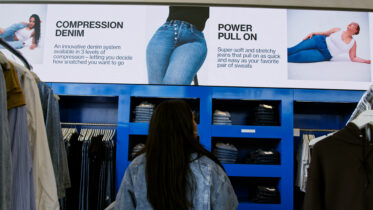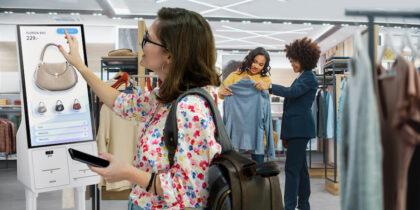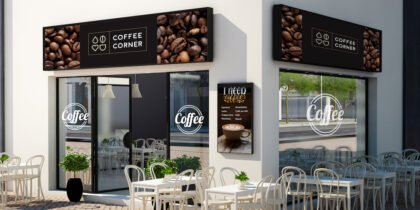You may have come across an article or two about stores being shuttered, but don’t jump to conclusions — we aren’t facing a retail apocalypse. In fact, stores are integral to the future of retail. Just ask ecommerce pure plays like Warby Parker and Casper that are opening physical locations to support their fast-growing brands.
But to thrive and grow, retailers know they must replace tired paradigms with more engaging, exciting approaches to shopping. For many, that means infusing stores with new retail technology, including mobile tools and data that enable associates to personalize, inform and enrich the shopping experience.
According to BRP, retailers stand to gain a 25 percent revenue upside by delivering a great digital customer experience in the store. “Betting on reinventing the store and incorporating a highly digital footprint pays dividends across multiple parameters. It helps retain consumers and grow their value by 25 percent-plus while acquiring new consumers from competitors, which is critical in an over retailed market.”
Changing the Economics of the Store Floor
As retailers set out to reinvent their stores, transforming the economics of the store floor is a primary focus. For decades, most retail technology investments have been limited to front-end POS terminals, backroom servers and handheld scanners — all purpose-built for specific functions. Labor was similarly allocated, especially at the front end to ensure customers could move quickly through checkout.
But from the time customers entered stores until they reached the checkout lane, the shopping experience was almost completely analog. Retailers had no way to bring data or digital capabilities to identify customers or deliver digital content, customer history or inventory information to satisfy shoppers’ needs. As a result, most in-store retail technology was a cost that made sales faster and easier, but did not drive them.
Transform Retail Associate Performance
Get your free guide to empowering retail associates with mobile devices and data. Download Now
Next-gen retail is about infusing stores with rich, real-time data and technologies that enhance the customer experience. That takes a number of forms, from mobile devices to digital signage to IoT. But the overall goal is the same: to impact the bottom line by driving or saving the sale, prompting cross-selling/upselling and delivering a satisfying experience that keeps the customer coming back.
Mobile’s Transformational Role
Among all of the transformational technologies retailers are deploying to meet this goal, mobile devices in the hands of store associates are arguably the most important. This is particularly true for high-touch retailers such as big box stores, specialty stores, luxury and home furnishers, which depend on a positive customer-associate encounter to deliver the brand experience. It’s clear that consumers value the experience of working with an associate armed with access to knowledge and information.
- 49 percent of shoppers are “extremely likely” to make a purchase when helped by a knowledgeable associate, and another 39 percent are “somewhat likely.” — TimeTrade
- Retailers rate the top benefits of mobile as increased customer satisfaction (58 percent), improved employee morale (44 percent) and increased upsells and cross-sells (42 percent). — Retail TouchPoints
- Sales growth is 77 percent for retailers providing mobile sales tools for staff and 92 percent higher for mobile POS. — IHL
When retailers put mobile devices in the hands of every store associate, they invest directly in customer experience. The right mobile device, paired with access to real-time, relevant data, empowers every associate to understand the unique needs of each customer and share product content, inventory data and expert knowledge to guide them to the right selection. They can also process the transaction so the customer can enjoy a more convenient experience and be on their way. And when not in use for direct customer assistance, that same device works just as well to scan inventory, process fulfilment orders and communicate among staff, optimizing the productivity of devices and associates.
The right device is one that is intuitive and easy to use, such as a Samsung mobile device that runs Android. It allows store associates to get up to speed quickly to serve customers and perform operational tasks like taking inventory or fulfilling digital orders — critical tasks for short ramp-ups like seasonal hiring and pop-up stores. Having a single, versatile device that works for clienteling, inventory management and point of sale also enriches the employee’s experience, increasing job satisfaction and longevity.
Mobile Supports Next-Gen, Revenue-Driving Stores
The future of retail is about driving revenue by driving positive experiences. That’s why more than half (55 percent) of retailers are investing in new technologies as their most important store operations priority, according to Retail TouchPoints. RSR found 65 percent of retail winners versus 38 percent of all others say there will be more selling activity in stores over the next two years.
By enabling data-fueled, knowledgeable and personalized service, mobile devices are critical to the transformation. Devices help store associates deliver the elevated customer experience retailers know they need, while acting as powerful drivers of new revenue and customer loyalty.
Learn more about how mobile devices can drive associate performance and enhance customer interaction in our free white paper.








